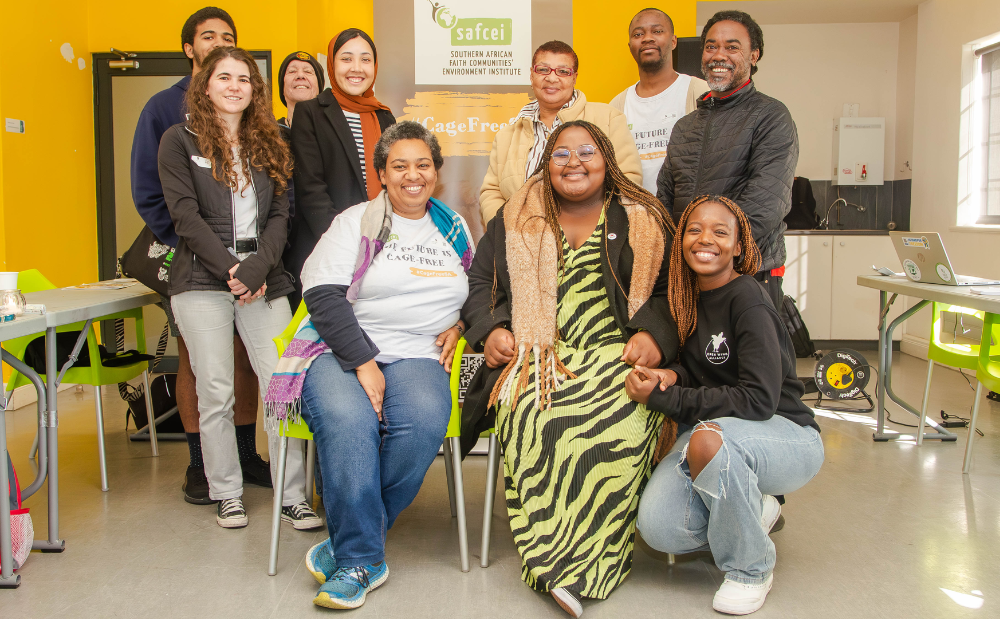Cage-Free Community Indaba calls for an end to battery cages for layer hens
- Published:

The second Cage-free Community Indaba this year – hosted by the Southern African Faith Communities’ Environment Institute (SAFCEI) at Bertha House in Cape Town on Wednesday – called for an end to cages for layer hens. SAFCEI says in two decades industry has made little effort to cease its cage farming practices, leaving 95% of South Africa’s layer hens confined in cages with less than an A4 page space for each hen. Cage-free Eggs Campaign Coordinator, Zwelisha Shobede, says “The campaign aims to end the suffering of layer hens and draws attention to the health implications of continued cage farming on both the hens and consumers. The objective of the Community Indaba is to spotlight our critical concerns and explore what meaningful change in South African poultry farming practices would mean for safeguarding both animal and human health for generations to come.”
The Department of Agriculture, Land Reform and Rural Development (DALRRD) reported that 26 outbreaks of avian flu were reported in 2023, where six out of nine provinces were affected. The Western Cape, Northern Cape, North West, Kwa-Zulu Natal, Mpumalanga and Gauteng provinces were gravely affected, with significant impact on poultry sales. Shobede says, “It is important to note that only 1% of the national commercial flock is cage-free and 4 % is free-range, the rest are caged. Egg-laying hens are among the most abused animals bred for food in South Africa. They live in cramped, unhealthy conditions and sometimes never see natural light. That is a potential breeding ground for the next health pandemic.”
SAFCEI’s cage-free egg campaign focuses on the state of animal welfare in South Africa and the inhumane cages used for animal farming which can lead to zoonotic diseases. The South African poultry industry has a history of devastating avian flu outbreaks. In the last eight years, various strains of avian flu led to the culling of 15 million birds. The H5N8 strain in 2017 resulted in 2.5 million birds being culled, a further 3 million were culled due to H5N1 in 2021 and 9.5 million - which was a third of the national flock - in 2023 was culled during the worst outbreak of high-pathogenic avian influenza (HPAI).
During last year’s avian flu outbreak, Founder of EATegrity and food system researcher, Sonia Mountford said there are many small scale free-range and cage-free producers that cannot compete with the highly concentrated and dominant vertically integrated caged egg producers. She highlighted that the motivation for continuing with caged farming was, unfortunately, not just about food security but market domination and profits. Mountford said, “I’ve been looking at the egg value chain and engaging with industry, farmers, and retailers for the last six years. I have engaged several well-established free-range and cage-free farmers who are longing to have access to the big retail market. But they cannot gain access to the big retailers due to low farmgate prices offered by retailers, while the retailer profit margins increase and are out-pricing their eggs for sustainably-minded consumers.”
SAFCEI encourages consumers to make ethical food choices and support healthier practices by using cage-free eggs which are bred under more humane conditions. Cage-free egg production systems are reported to have lower environmental footprints compared to conventional caged systems, and they benefit ecosystems and biodiversity. SAFCEI Executive Director, Francesca de Gasparis said, “Eliminating cages allows the hens to move more freely; perch, spread their wings, dust bathe, access nest boxes, interact with their flock, as nature intended and enjoy a healthier life free from a cramped cage. Hens in more natural farming systems experience improved quality of life, leading to healthier birds and eggs”
Benefits of eating cage-free eggs
- Hens in cage-free systems experience improved quality of life, stronger immune systems leading to healthier birds and higher-quality eggs.
- Two-thirds more vitamin A and three times more Vitamin E.
- Seven times more beta-carotene and twice the amount of omega-3 fatty acids.
- Cage-free and free-range eggs have significantly more B vitamins in comparison to store brand eggs.
- Contain less saturated fat.
- Add high levels of carotenoids and lutein; an organic pigment called carotenoid which is related to the natural care of visual health.
Footnotes:
Intensively farmed animals play a critical role in cross-species transmission of zoonotic viruses, as well as providing amplification of disease transmission to each other and to people.
Kreuder Johnson C, Hitchens PL, Smiley Evans T, et al. 2015. Spillover and pandemic properties of zoonotic viruses with high host plasticity. Scientific Reports 5:14830. www.nature.com/articles/srep14830.
Last year, South Africa lost 9.5 million chickens, about a third of its national flock, during its worst outbreak of high-pathogenic avian influenza (HPAI), a bird flu with a high death rate that spreads rapidly through a flock. https://www.reuters.com/business/healthcare-pharmaceuticals/safricas-top-poultry-producer-flags-bird-flu-risk-amid-vaccine-delays-2024-05-20/
The outbreaks of highly pathogenic avian influenza (HPAI) adversely affected poultry farmers in South Africa during 2023. It is estimated that approximately 8.5 million chickens (2.5 million broiler breeders, raised specifically for meat production, and approximately 6 million of the layer flock, bred for laying eggs) were culled, according to the South African Poultry Association (SAPA). The outbreaks led to considerable shortage of product and subsequent price increases. https://www.resbank.co.za/content/dam/sarb/publications/quarterly-bulletins/boxes/2024/Box 1.pdf
Who we are

SAFCEI (Southern African Faith Communities’ Environment Institute) is a multi-faith organisation committed to supporting faith leaders and their communities in Southern Africa to increase awareness, understanding and action on eco-justice, sustainable living and climate change.
Featured Articles
-

South Africa: Who Ends Up Paying If DMRE Cooks the Price of Nuclear Power?
-

South Africa’s nuclear energy expansion plans continue to draw criticism, environmental NGOs chew over legal challenge
-

Earthlife Africa and SAFCEI respond to latest unsettling nuclear news regarding the ministerial determination
-

Open Wing Alliance Africa (Virtual) Summit 2023
-

The Green Connection and SAFCEI respond to energy minister's divisive and deflecting comments
-

Job Vacancy: FLEAT Coordinator







